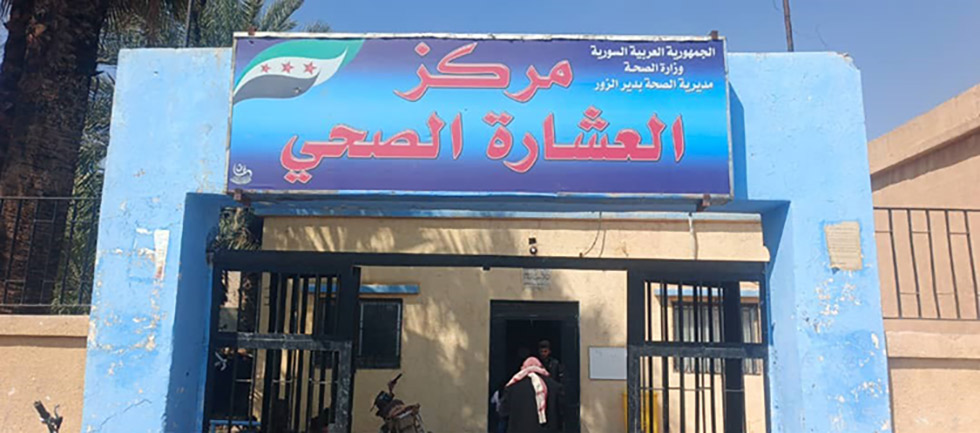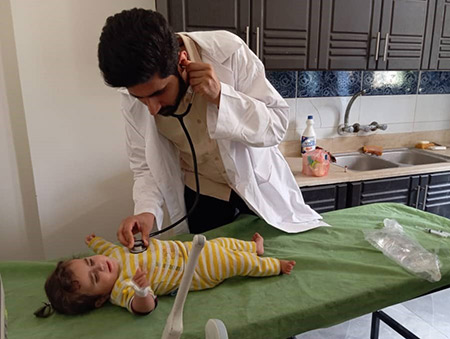 The entrance of Al-Ashara Primary Health Centre in rural Deir ez-Zor, where emergency services have been supported. Photo: WHO
The entrance of Al-Ashara Primary Health Centre in rural Deir ez-Zor, where emergency services have been supported. Photo: WHO
30 May 2025, Syrian Arab Republic – In rural areas of Deir ez-Zor, access to timely medical care has long been a challenge. For families living in rural towns like Mahkan and Al-Ashara, reaching the nearest hospital can take hours – a delay that can turn minor injuries into life-threatening emergencies.
But with WHO’s support, that gap has begun to close.
Expanding emergency health services in Mahkan and Al-Ashara
In coordination with the Deir ez-Zor Directorate of Health and local implementing partner Syria Pulse Association, WHO supported the activation of 2 fully equipped emergency units at Mahkan and Al-Ashara primary health centres.
Each centre operated with a trained team – including a doctor, nurse, paramedic, driver and support staff – and was equipped with an ambulance, essential medicines and emergency supplies. The centres were also linked to referral hospitals in Deir ez-Zor City and Al-Ashara City, ensuring that patients in need of advanced care could be transported safely and quickly.
 Dr. Hadi Abdul Rahman Al-Sheikh examines 9-month-old Bayan Al-Darfil at Mahkan Public Health Centre in Deir ez-Zor. Photo: WHO
Dr. Hadi Abdul Rahman Al-Sheikh examines 9-month-old Bayan Al-Darfil at Mahkan Public Health Centre in Deir ez-Zor. Photo: WHO
Stabilizing a critically ill infant in Mahkan
When 9-month-old Bayan Al-Darfil was brought to Mahkan Primary Health Centre by her father, she was in critical condition. Bayan had been vomiting for hours and was found to have food poisoning and a rapid heart rate of 180 beats per minute.
The emergency team administered IV fluids and medication and then transported her using the project-supported ambulance to Al-Ashara National Hospital where she received further care until her condition stabilized.
Bayan’s father later said, “Thank you for the care you gave my daughter. We appreciate the medical team and the quality of services at the centre.”
Treating burn injuries and building caregiver confidence
At Al-Ashara Primary Health Centre, 3-year-old Bisan Sabouh Al-Saleh arrived with second-degree burns on her left leg after a household accident involving boiling water.
She was treated immediately. “Cleaning, dressing, pain relief and daily follow-up were provided by the emergency team,” her file notes. “Her mother was educated on how to continue care at home. The child is still under supervision and improving steadily.”
Responding to conflict-related trauma with urgent care
At Al-Ashara Public Health Centre, a 20-year-old man arrived at midnight with a gunshot wound to the abdomen. After a clinical examination, the emergency physician determined that the injury was isolated – with no vascular, neurological, or bone damage.
“The entry and exit points of the bullet were cleaned and sterilized. The wound was sutured and the patient was given antibiotics,” said Dr. Ahmed Al-Marzouk, the attending physician. “The patient’s condition improved and stabilized after treatment and he was discharged in good condition.”
Extending access through telemedicine and health education
To improve access to care in remote and underserved communities, Syria Pulse Association also operated a telemedicine and remote health education service from a static point in Deir ez-Zor city’s Al Kousour neighbourhood.
A team of general practitioners and rotating specialists, including internal medicine doctors and gynaecologists, work in 2 daily shifts, providing telemedicine consultations from 9:00 to 21:00, and 6 trained health educators deliver remote risk communication and community engagement messages, sharing vital information on primary health care, disease prevention and how to seek care.
These services helped reach families who could not afford transportation or lived too far from functioning health centres, ensuring they still received timely medical advice and follow-up support.
Saving lives and reducing pressure on families
In addition to on-site emergency care, families also benefitted from safe referrals, home-care guidance and access to remote services.
This emergency health response was made possible thanks to the Syria Humanitarian Fund (SHF) – a multi-donor funding mechanism managed by the United Nations Office for the Coordination of Humanitarian Affairs (OCHA).
For the people of Deir ez-Zor, access to emergency care is no longer out of reach. Whether it’s a burn, a bullet wound, or a sick child – these services have helped communities respond faster, recover sooner and reduce the burden on families.




